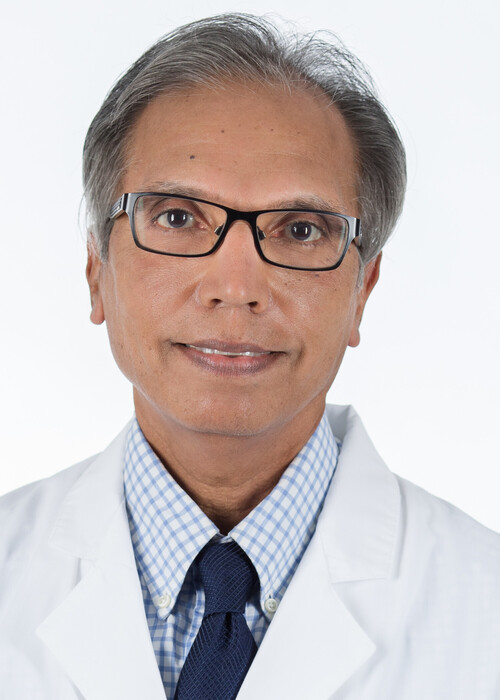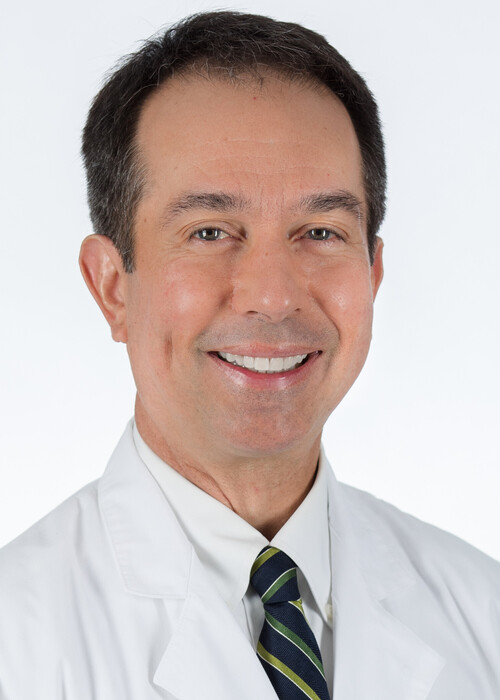





The Meaning of Care Magazine
Methodist Clinic Was a Key Driver in the Now Standard ‘Watch and Wait’ Approach to Rectal Cancer
Published: Aug. 24, 2022

Spring 2022 was a busy time for Bill Singer.
Despite shifting into semiretirement, Bill had his hands full as he moved from Glenwood, Iowa, to the acreage he and his wife, Rhonda, own near Corning. If he wasn’t working on a project tied to the move, he was on the water.
“If they’re biting, I go fishing,” said Bill, 63, who also enjoys boating on Lake Icaria near Corning and other area lakes.

The last thing on his mind, however, was his battle with rectal cancer six years earlier. These days, he doesn’t spend time thinking about the weeks of chemoradiation – a combination of chemotherapy and radiation therapy – followed by more chemotherapy. He’s blocked out memories of how the treatments caused nausea and peripheral neuropathy – in his case a sensitivity to cold – but also eradicated his stage 2 tumor.
“You forget the bad things,” he said. “Luckily, the human mind is that way.”
For Bill, fighting cancer was a time in his life that’s done and gone. But for M. Shashidharan, MD, Bill was part of a group of patients that helped doctors pioneer a new standard of care for rectal cancer.
“Being my first patient that we solely treated with ‘watch and wait,’ I’ll never forget his name,” said Dr. Shashidharan, a colon and rectal surgeon with Methodist Physicians Clinic Colon and Rectal Surgery.
Surgically Treating Rectal Cancer
Colorectal cancer – cancer of the colon or rectum – is the third-leading cause of cancer-related deaths in the U.S. The American Cancer Society estimates that over 151,000 new cases will be diagnosed this year, including over 44,000 new cases of rectal cancer.
Most colorectal cancers begin as growths known as polyps, which often can be removed surgically during a colonoscopy. For decades, advanced rectal cancers were treated with chemoradiation followed by more involved surgical removal and then chemotherapy.

“For locally advanced rectal cancers that were stage 2 and 3, the end of the road was always surgery unless they were too sick to have it,” said Charles Ternent, MD, a surgeon with the colon and rectal surgery clinic.
Every patient with cancer has their case reviewed at a multidisciplinary tumor conference, and together, Methodist’s surgeons perform roughly five rectal surgeries per month. While surgery for rectal cancer that hasn’t spread to other tissue, organs or lymph nodes has an estimated 90% five-year survival rate, it comes with a cost. Surgery for these tumors requires removing part or all of the rectum and connecting the colon to the lower rectum or the anus, which can lead to bowel habit changes and control issues for patients. In some cases, that connection isn’t possible, or a patient’s anus also is removed, resulting in a colostomy.
“Surgery for rectal cancer comes with some definite quality-of-life changes,” said Garnet Blatchford, MD, a Methodist colon and rectal surgeon and the vice president of medical affairs and chief medical officer for Methodist Hospital and Methodist Women’s Hospital. “There’s no doubt their quality of life is better if they don’t have to have the surgery for a cure.”
In 2020, with help from the colon and rectal surgery clinic, a nonsurgical solution known as “watch and wait” became a possibility for many patients.
“The Tumor Melts Away”
Founded in 1919, the colon and rectal surgery clinic is considered the area’s leader in treating colon and rectal diseases and conditions. Providers at the clinic, which joined Methodist Health System in 2020, are also active in clinical trials.
“They answer the question we are asking, which is, ‘What’s the best for our patients?’” Dr. Ternent said. “And we know because we’ve done these studies. They change the way we treat our rectal cancer patients. The No. 1 mission for us is to take good care of patients. We think that this is key for us to be at the forefront so we can bring our patients the knowledge and quality of care that they deserve.”
In 2004, the clinic was invited to join an eight-year trial led by Memorial Sloan Kettering Cancer Center and funded by the National Institutes of Health (NIH). The goal was to explore the optimal timing of rectal cancer surgery after chemoradiation by incrementally extending that period and adding cycles of chemotherapy before surgery instead of after, which was the norm. The study, which included clinics and cancer centers nationwide, found that where previously about 25% of rectal surgery patients had no signs of cancer in tissue that was surgically removed – known as complete pathologic response – now the number increased to 40%.
That research helped lead to another trial from 2014 to 2018 – again led by Sloan Kettering, funded by the NIH and including the colon and rectal surgery clinic – in which researchers sought to determine if patients who showed complete clinical response through frequent clinical exams, colonoscopies and MRIs could avoid surgery and organ removal altogether.
The results were again encouraging. Up to 53% of rectal patients taking this “watch and wait” approach experienced a complete clinical response after three years and were able to avoid resection surgery.
“In other words, the tumor melts away,” said Dr. Ternent, who was the principal investigator for his clinic’s part of the study.
These patients are still monitored closely, as about 30% will have a recurrence of cancer after a complete clinical response. For at least five years, “watch and wait” patients need frequent rectal and endoscopic exams, CT scans, and MRIs. If the cancer does return, it’s usually successfully treated with surgery. In 2020, the approach was added to the National Comprehensive Cancer Network’s guidelines for rectal cancer care. The latest data shows that about half of patients with stage 2 or 3 rectal cancer may achieve complete clinical response and be eligible for “watch and wait.” Today, every Methodist Colon and Rectal Surgery provider offers the approach, and about 75 Methodist patients are being treated with it. The clinic also has a database that tracks the outcomes and quality of life for over 500 colon and rectal cancer patients.
“With six Methodist colon and rectal surgeons comfortable with traditional therapy and ‘watch and wait,’ patients can expect an individually tailored treatment plan that melds best practices with their personal wishes,” said Zachary Torgersen, MD, a surgeon with the colon and rectal surgery clinic.
Still, the doctors said, the approach isn’t for everyone. Even with thorough screening, doctors can’t guarantee that cancer has been eliminated or won’t recur.
“Some people aren’t comfortable with that,” he said. “For peace of mind, they want that organ removed. But when we talk to patients about rectal cancer, this is an option. Nowadays you have more and more options.”
“I Want To Try It”
Bill was shocked when he received the news that he had rectal cancer. He has no family history of colorectal cancer, and his recommended colonoscopy at age 50 with Jason Cisler, MD, of Midwest Gastrointestinal Associates, went smoothly. He thought his next colonoscopy at age 55 would, too, and he was focused on celebrating his grandson’s birth a few days earlier. But when the screening revealed a mass, Dr. Cisler referred Bill to Dr. Shashidharan, who performed a biopsy to confirm the cancer.
“It’s still hard to talk about,” Bill said. “When they first told me I had cancer, I wondered how long I’d be able to see my grandson. You just don’t know.”
Working with a team that included Timothy Huyck, MD, an oncologist with Nebraska Cancer Specialists and the medical director at Methodist Estabrook Cancer Center, Dr. Shashidharan confirmed that Bill’s cancer hadn’t spread and that he was a good candidate for the “watch and wait” study.
“I said, ‘You know, I want to try it,’” said Bill, who wanted to avoid surgery if possible. “That’s a life-changing deal.”
He began over a month of chemoradiation followed by six more months of chemotherapy.
“It was no party, let me tell you,” he said.
But in October 2016 he got the good news from Dr. Shashidharan. His tumor had disappeared. And, at least for the time being, he didn’t need surgery.
In the months that followed, Bill faithfully attended follow-up appointments but worried what he might learn.
“Initially, any time we saw him in the office to do an examination, you could see the anxiety,” Dr. Shashidharan said. “But when I examined him and could tell him, ‘Hey, there’s nothing that I can see,’ then there was excitement and happiness. He was very grateful. Those are things I’ll remember.”

Bill has been cancer-free for over five years now. Every three years he has a colonoscopy, a reminder that he’s not completely out of the woods, but he’s glad he fought his cancer the way he did.
“You can’t let it get you,” he said. “You can’t let it take over your life.”
And he’s thankful for the doctors whose work led him to where he is now.
“It’s unbelievable. I think it’s fantastic that Omaha has these kinds of clinics.”
Photos by Daniel Johnson
More Resources
- Read more from the summer 2022 issue of The Meaning of Care Magazine.
- Learn more about Methodist Physicians Clinic Colon and Rectal Surgery.
- Learn more about clinical trials at Methodist.


